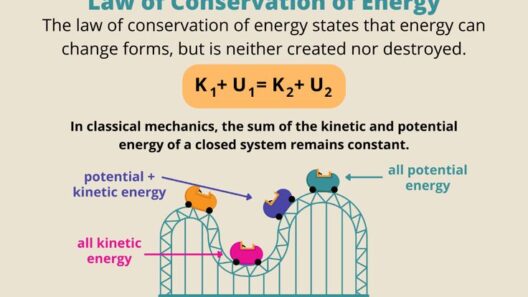Genetically Modified Organisms (GMOs) present a contentious debate in the context of modern agriculture. The discussion surrounding GMOs often aligns with various environmental considerations, particularly energy conservation in agricultural practices. This discourse is vital as the world grapples with climate change, population growth, and the sustainability of food production. Advocates and critics alike have made claims about the energy implications of GMO usage, leading to an imperative examination of the potential benefits and drawbacks. This article will delve into whether GMOs can conveniently conserve energy, an essential aspect of the broader agricultural debate.
At the onset, it is crucial to define what constitutes GMOs. Genetically modified organisms are living organisms whose genetic material has been artificially manipulated in a laboratory through genetic engineering. These modifications can enhance certain traits, such as pest resistance, drought tolerance, and nutritional value, potentially leading to higher crop yields. In the context of energy conservation, these traits can have significant ramifications for agricultural practices.
One of the predominant arguments in favor of GMOs is the assertion that they can lead to increased efficiency in the energy-intensive process of farming. Traditional farming methods can be resource-heavy, requiring significant inputs such as fuel for machinery, water for irrigation, and fertilizers. By engineering crops to be more resilient against pests or adverse climate conditions, farmers may reduce the reliance on chemical pesticides and irrigation systems. This reduction can yield substantial energy savings over time, leading proponents to argue that GMOs inherently conserve energy.
Furthermore, the development of herbicide-resistant crops has transformed land management practices. Farmers can now utilize no-till or reduced-till methods, which conserve energy by minimizing tractor use. Conventional tillage is laborious and energy-consuming; by adopting GMOs that allow for less soil disturbance, farmers can manage land with reduced fossil fuel consumption. This approach not only conserves energy but also mitigates soil erosion and enhances carbon sequestration—both vital processes in combating climate change.
However, the energy conservation narrative surrounding GMOs is not universally accepted. Critics point out that the reliance on chemical inputs linked to GMO farming may negate some of the energy savings. For instance, although herbicide-resistant crops may reduce tractor usage, they also lead to increased herbicide application, which is energy-intensive to produce and transport. Moreover, as pests and weeds evolve, higher volumes of herbicides may be required over time, undermining the initial energy savings touted by advocates.
Additionally, the energy footprint of producing GMOs must be carefully considered. The creation of genetically modified seeds involves a substantial energy investment in research, development, and production phases. The lifecycle analysis of GMO crops—taking into account all stages from laboratory to field—reveals that the overall energy efficiency is complex and multifaceted. Some studies have suggested that while GMO adoption leads to certain efficiencies, it may not significantly reduce the agricultural sector’s energy consumption on a larger scale.
The topic of GMOs also intersects with the principles of sustainable agriculture. Sustainable practices prioritize maintaining ecological balance and minimizing resource use while maximizing output. In this regard, GMOs offer a dual perspective; they can enhance agricultural productivity, but their environmental impact must be critically evaluated. As a crucial segment of the climate change narrative, the implications of adopting GMO technology in agriculture call for an in-depth examination of sustainability.
Renewable energy sources present another layer to this debate. The integration of GMOs within a framework powered by renewable energy could enhance overall energy conservation in agriculture significantly. For instance, harnessing solar or wind energy for irrigation systems, coupled with GMO crops that require less water, may yield a more sustainable farming model. This symbiosis highlights the potential of using technological advancements, like GMOs, alongside renewable energy innovations to achieve energy conservation goals in agriculture.
Inspiring developments in precision agriculture also play a critical role. This emerging sector utilizes technology to optimize input use, ensuring that farmers apply the exact amounts of water, fertilizers, and pesticides needed. GMOs, which may be tailored to specific local conditions, can work synergistically in precision farming systems, enabling a more effective means of conserving energy and resources. When crops are cultivated efficiently, they can lead to reduced overall consumption of energy throughout the agricultural cycle.
However, ethical considerations arise with the widespread adoption of GMOs. The debate over who controls the technology often overshadows the conversation about energy conservation. Many GMO crops are protected under intellectual property rights, which can limit farmers’ choices and lead to increased costs. Consequently, the focus on energy conservation should not overshadow the necessity for equitable access to technologies that promote sustainable agricultural practices.
In summary, the question of whether GMOs conserve energy is multifaceted and warrants careful analysis. Enthusiasts have touted the efficiencies stemming from high-yield crops, while critics note the potential increases in chemical input use and the complex energy inputs related to GMO production. Furthermore, the intersection of GMOs with sustainable practices, renewable energy, and precision agriculture formulates an intricate tapestry of benefits and drawbacks. Ultimately, the pursuit of energy conservation in agriculture transcends the adoption of GMOs; it encompasses a holistic approach to enhancing sustainability in the face of escalating climate challenges. As discussions continue, it remains essential to critically evaluate the roles of technology and agricultural practices in the quest for an ecologically sound future.







